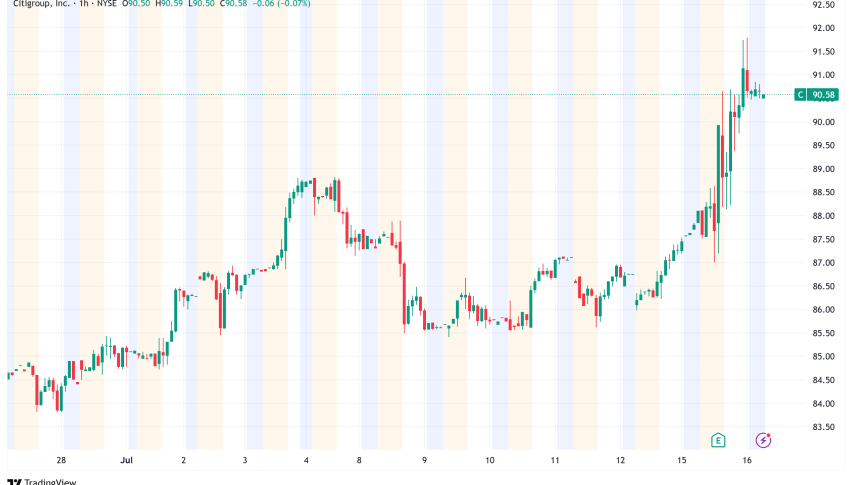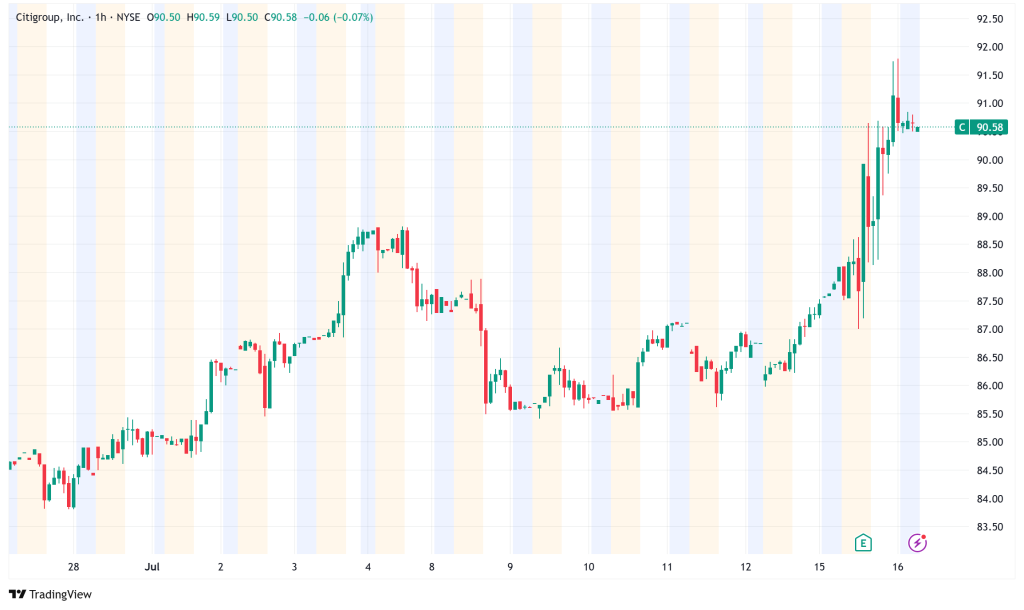Citigroup Eyes Stablecoin Market Entry, Strong Q2 Results Signal Digital Finance Push
Citigroup Inc. had a great second quarter that beat Wall Street's forecasts. It also showed a big shift in strategy toward digital assets,

Quick overview
- Citigroup Inc. reported a strong second quarter with net profits of $4.02 billion, a 25% increase from the previous year.
- The bank is exploring the issuance of its own stablecoin to enhance digital payments, aligning with the growing stablecoin market.
- Citigroup's trading revenues rose 16% year-over-year, contributing to its best second quarter performance since 2020.
- Despite challenges from rising borrowing costs, Citigroup raised its full-year revenue forecast and announced stock buybacks and a dividend increase.
Citigroup Inc. had a great second quarter that beat Wall Street’s forecasts. It also showed a big shift in strategy toward digital assets, which might include the issuing of stablecoins.

The big bank made $4.02 billion in net profits for the quarter that ended on June 30. This was a 25% rise from the same time previous year. Earnings per share were $1.96, which was far higher than the analyst’s projection of $1.60. Revenue rose 8% to $21.67 billion, which was more than the $20.98 billion forecast.
Citi’s Digital Asset Ambitions
The most important news came from CEO Jane Fraser’s admission during Tuesday’s post-earnings conference call that Citigroup is seriously thinking about making its own stablecoin to make digital payments easier. Fraser told investors, “We are looking into the issuance of a Citi stablecoin, but the tokenized deposit space is probably the most important thing for us right now.” “This is a good chance for us.”
According to DefiLlama data, the stablecoin market has grown to $258 billion, a 58% rise since July 2024. This puts Citigroup in the same league as JPMorgan Chase in the quest to get more market share in the fast increasing stablecoin sector. Fraser also said that the bank is looking into how to maintain reserves for stablecoins and how to keep crypto assets safe.
This change in strategy comes at a time when more and more traditional banks see stablecoins as a valid means to get into digital finance, especially as the rules are becoming clearer in the US. The Senate has passed the GENIUS Act, which would set rules for stablecoins and the people who issue them. The House is now looking at it.
Strong Trading Performance Drives Results
Citigroup’s strong quarterly results were due to strong trading revenues, which rose 16% year over year. The bank’s equities trading business grew by 6% over the course of a year and 7% over the course of a quarter. This helped the markets division have what Fraser called the “best second quarter performance since 2020.”
Banking revenues also did well, going up 18% from the second quarter of 2024, even though loan hedges lost money. Fraser thinks that Citigroup’s trading businesses will continue to gain from market volatility, which is what the bank’s performance shows.
Fraser remarked during the analyst call, “Volatility is going to be a feature, not a bug, of the new world order, and we will benefit from that.”
Transformation Progress and Future Outlook
As part of its multi-year transformation plan, Citigroup is pulling back from some international markets. As part of this restructuring effort, the bank announced layoffs in China in June. However, Fraser said that the broader transformation strategy had made “significant progress.”
Citigroup boosted its full-year revenue forecast to $84 billion, which is at the high end of what it had previously predicted. The bank also said it would buy back at least $4 billion worth of stock and raise its quarterly dividend from 56 cents to 60 cents per share.
But the bank is having some problems because the cost of borrowing is going up by 16% because of higher allowances for credit losses. Fraser said that the economic situation was getting worse and that clients were hiring fewer people and spending less money.
Market Response
After the earnings report, Citigroup shares rose 3.7%, reaching their highest level since the 2008 financial crisis for a short time. Investors were happy with the results. This year, the stock has done far better than the market as a whole, up 24% so far this year and 38% since mid-April.
As traditional banks start to accept more digital assets, Citigroup is in a good position to compete in a changing financial landscape where stablecoins are becoming common tools for businesses and people all over the world. This is because Citigroup focuses on both strong fundamental performance and new financial technologies.
- Check out our free forex signals
- Follow the top economic events on FX Leaders economic calendar
- Trade better, discover more Forex Trading Strategies
- Open a FREE Trading Account


